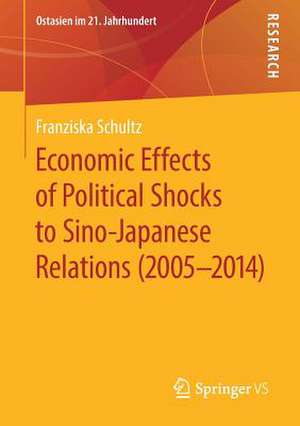Economic Effects of Political Shocks to Sino-Japanese Relations (2005-2014): Ostasien im 21. Jahrhundert
Autor Franziska Schultzen Limba Engleză Paperback – 24 iun 2019
Preț: 463.68 lei
Preț vechi: 545.51 lei
-15% Nou
Puncte Express: 696
Preț estimativ în valută:
88.72€ • 92.88$ • 73.41£
88.72€ • 92.88$ • 73.41£
Carte tipărită la comandă
Livrare economică 05-19 aprilie
Preluare comenzi: 021 569.72.76
Specificații
ISBN-13: 9783658266585
ISBN-10: 3658266589
Pagini: 156
Ilustrații: XVI, 156 p. 11 illus.
Dimensiuni: 148 x 210 mm
Greutate: 0.21 kg
Ediția:1st ed. 2020
Editura: Springer Fachmedien Wiesbaden
Colecția Springer VS
Seria Ostasien im 21. Jahrhundert
Locul publicării:Wiesbaden, Germany
ISBN-10: 3658266589
Pagini: 156
Ilustrații: XVI, 156 p. 11 illus.
Dimensiuni: 148 x 210 mm
Greutate: 0.21 kg
Ediția:1st ed. 2020
Editura: Springer Fachmedien Wiesbaden
Colecția Springer VS
Seria Ostasien im 21. Jahrhundert
Locul publicării:Wiesbaden, Germany
Cuprins
Economic Spillovers of Shocks within Sino-Japanese Relations.- Analysis of the Correlation between Trade and Conflict Values (2005-2014) with Vector Autoregression.- Spillovers in Japan-China Economic Association Reports.
Notă biografică
Franziska Schultz was Research Associate at the Department of Japanese Studies at Eberhard Karls Universität Tübingen and is currently as Research Affiliate at the Centre for Asian Area Studies at Rikkyo University in Tokyo.
Textul de pe ultima copertă
Diplomatic issues, i.e. the textbook discussion, the Yasukuni debate, and the Senkaku/Diaoyu Islands dispute cause political shocks to Japan-China relations, but economic exchange is maintained. Franziska Schultz discusses political shocks within bilateral relations, analyzing shocks in 2005, 2010 and 2012 causing economic spillovers, such as boycotts, property damage and decreasing numbers of Chinese tourists to Japan. The correlation of monthly trade data with political conflict values (2005-2014) created by the author is analyzed with a vector autoregression (VAR) model. A qualitative content analysis of reports by the Japan-China Economic Association (1981-2015) according to Früh (2011) evaluates whether spillovers play a role for Japanese economic actors involved in China business.
Contents
- Economic Spillovers of Shocks within Sino-Japanese Relations
- Analysis of the Correlation between Trade and Conflict Values (2005-2014) with Vector Autoregression
- Spillovers in Japan-China Economic Association Reports
Target Groups
- Researchers and students in the fields of International Relations, Political Economy, Japanese Studies
- Scientists and experts in the fields of Japan, China and East Asian Affairs
The Author
Franziska Schultz was Research Associate at the Department of Japanese Studies at Eberhard Karls Universität Tübingen and is currently as Research Affiliate at the Centre for Asian Area Studies at Rikkyo University in Tokyo.
Caracteristici
Analysis of trade-conflict interaction for Japan-China relations













